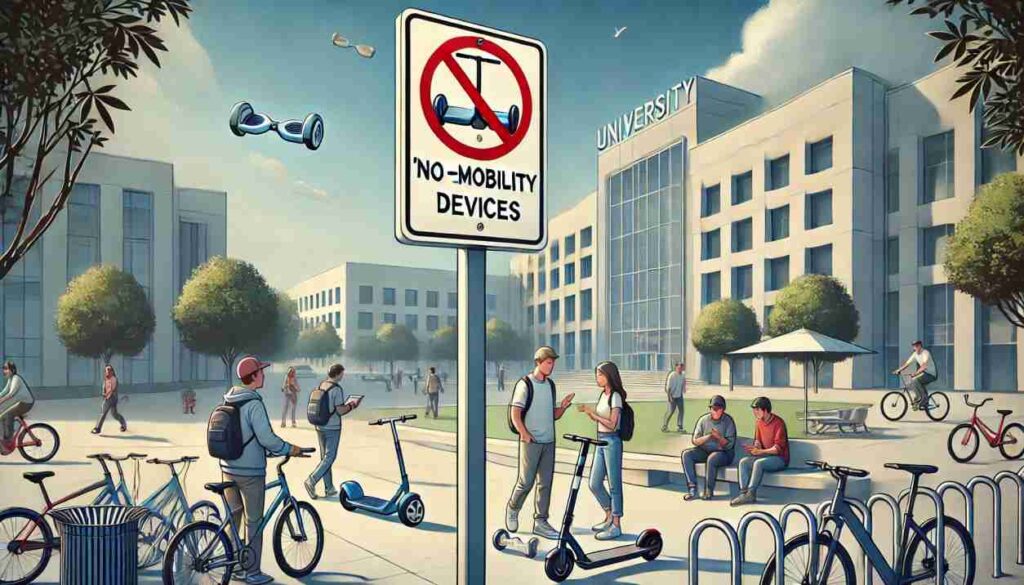
Introduction
The Institute’s newly established E-Mobility Student Safety Committee has presented a groundbreaking policy proposal to the Student Senate that aims to prohibit the use, storage, and charging of most e-mobility devices on campus. If approved, the policy will take effect on May 12, 2025, as part of efforts to mitigate risks associated with lithium-ion batteries.
Policy Details and Scope
The proposed policy explicitly bans all e-mobility devices except e-bikes from being used, charged, or stored on campus grounds. Devices such as e-scooters, hoverboards, electric skateboards, and other personal transportation tools powered by lithium-ion batteries would no longer be allowed.
While e-bikes are permitted under the new guidelines, their usage would be restricted to roadways only, and they would not be allowed to be charged on campus. This stipulation limits e-bike operation to students with access to off-campus housing, creating accessibility concerns for students who rely on these devices for transportation.
Safety Concerns Behind the Proposal
The policy was introduced following growing safety concerns surrounding lithium-ion batteries. This initiative was particularly prompted by a battery explosion incident at Dartmouth College last year, which highlighted the potential risks posed by the improper storage and charging of such batteries.
Monika Robertson, Director of Risk Management, and Kelli Perry, Associate Vice President of Finance, emphasized that the proposed ban is a proactive measure aimed at reducing fire hazards and enhancing campus safety.
Senate Discussion and Feedback
During the Senate meeting, several senators expressed conditional support for the policy but raised practical concerns about its implementation:
1. Outdoor Bike Storage Challenges:
- William Dugan, Class of 2025 Senator, pointed out that the current outdoor storage options could leave e-bikes vulnerable to weather conditions, potentially destabilizing their batteries.
- The prohibition of indoor storage might lead to overcrowded outdoor storage or, worse, encourage students to violate the ban by charging e-bikes inside dormitories, increasing fire risks.
2. Need for Infrastructure Improvements:
- Senators advocated for the installation of new outdoor storage and charging stations to ensure students have safe and convenient options for storing and operating their e-bikes.
In response, Perry assured the Senate that these concerns would be taken into consideration. She confirmed that the committee is collaborating with Campus Planning and Safety to refine the policy and explore infrastructure upgrades.
Other Key Senate Developments
After the e-mobility policy discussion concluded, attention shifted to concerns raised by the Graduate Council regarding the ethics of recent appointments to the Executive Board (E-Board).
1. Conflict of Interest Inquiry:
- The council questioned the appointments of certain non-voting E-Board members, suggesting that their officer roles in other clubs could influence their decision-making and compromise fairness.
- Ria Massoni ’25G, Graduate Senator, proposed the creation of a Committee of Ethical and Fair Appointments to investigate the matter thoroughly.
2. Formation of Ethical Appointments Committee:
- The Senate passed the motion to initiate the inquiry and form the committee with a vote of 16-0-1.
- Griffin Oliver ’27 was appointed as the chair of the committee, also by a 16-0-1 vote.
The committee will focus on evaluating the appointment process to ensure transparency and fairness in E-Board operations.
Conclusion
The Student Senate’s January 7 meeting underscored the Institute’s proactive approach to campus safety and ethical governance. The proposed e-mobility ban reflects the administration’s commitment to addressing modern safety challenges, while the formation of the Ethical Appointments Committee demonstrates a dedication to fostering accountability in student leadership.
The next Senate meeting is scheduled for Tuesday at 7 PM in the Shelnutt Gallery. Discussions will likely continue on refining the e-mobility policy and monitoring the progress of the newly established ethics committee.


